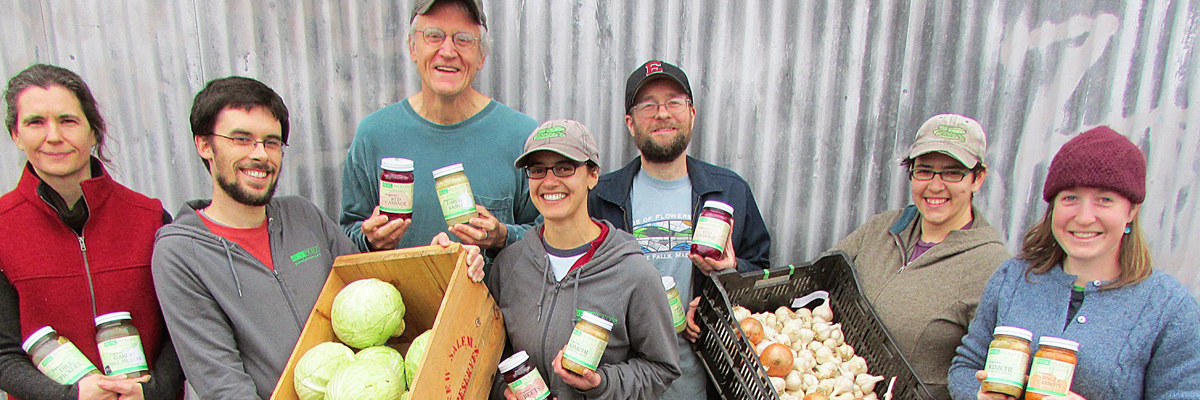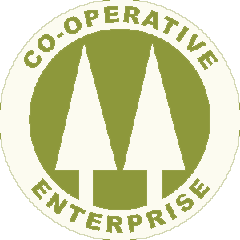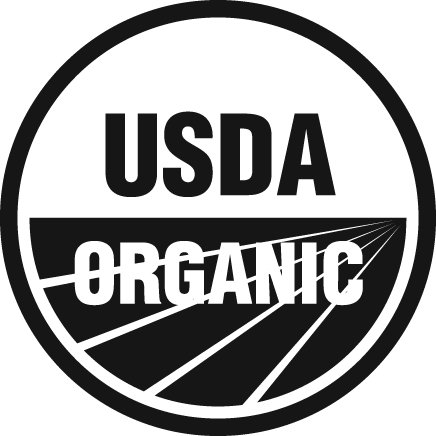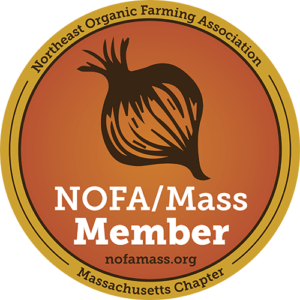
We just wrapped up our fiscal year at Real Pickles. In many ways, it was a typical year for the business. Interest in fermented foods has continued to rise, and the year was another strong one for us. As is often the case, the uncertainties of the growing season necessitated some creative problem solving (a wet spring in the Pioneer Valley resulted in much less early cabbage than we were expecting) but in the end we got all of the fresh ingredients we were hoping for and processed over 300,000 pounds of Northeast-grown vegetables during our production season, an increase of about 40% over last year!
What was different about this past year, however, was our structure as a business. May 9th marks the day that Real Pickles made the transition from a sole proprietorship to co-operative ownership. It took a lot of work to become a co-op, and now the process of running the business involves both shared effort and reward for our new group of member-owners. Some of what we encountered during our first year was expected and other things took us a little more by surprise. As an increasing number of businesses consider transitioning to the co-operative model, we want to share some of our experiences so far.
Learning to be Business Owners

sign the legal documents to convert Real Pickles to a co-operative.
(Photo credit: David J. Singer, Esq.)
As Real Pickles made the structural shift to becoming a co-op owned by its employees, those of us who hadn’t previously been owners knew we would have to make the mental shift to thinking like owners. Looking back a couple years, as the founding co-op group worked together to figure out if Real Pickles’ transition to a worker co-op made sense for the business and for each of us as individual potential owners, we spent quite a bit of time on activities that served the joint purpose of strategic planning and practicing the art of ownership. Inspired by our friends at South Mountain Company, we prepared an exercise that encouraged us to articulate what kind of growth we want for Real Pickles, and the possible outcomes of different approaches for our future. Since completing the transition, we’ve continued this important strategic planning work.
To further foster a learning culture in our business, we started holding internal classes on five core topics – Social Mission, History of Real Pickles, the Co-operative Movement, Finances and Governance. While all staff people attend, all potential worker-owners are required to complete these classes before becoming part of the co-op. This has given us all a common base of understanding of Real Pickles as a co-operative business and some of the tools we need to be effective business owners.
The need to think like owners was highlighted when, recently, we were looking at increasing certain benefits for staff – in this case, starting a Real Pickles sponsored retirement account, increasing our paid time off and implementing a family leave policy. While we as employees were, in principle, supportive of enhancing benefits for ourselves and our co-workers, as owners we also had to take responsibility for the impacts of these decisions on the business that provides us with employment. When we looked at the costs within our budget for next year, we ended up proceeding more cautiously, scaling back the new benefits for the upcoming year with the understanding that we will revisit this topic after we have another year as a co-op under our belts and can envision what long term sustainability looks like.
Another example of new owners having to broaden their perspectives came recently when it was time for Dan’s first annual review as General Manager. A small group of board members was formed to conduct the review process. This process of evaluating our General Manager — who is also the founder, hired many of us and who many of us report to directly — exemplifies how the workers have had to step up and manage multiple roles with this new co-operative. In the end, the review went extremely well. It was a powerful experience for all involved and a clear example of what makes a co-op different from other business models.
Charting Our Future
Last May, as we looked forward, we knew that if the co-op was to be successful over time we would have to make worker-ownership appealing to more staff people. We expected that other employees would see the value of being worker-owners but didn’t expect it to happen so quickly. Even before we officially made the transition to a co-op, two more staff people expressed their interest. In the midst of working on our business strategy, investment campaign, incorporation and legal documents, we had to scramble to articulate the “path to worker-ownership” at Real Pickles, with an eye to finding the balance between making the ownership process clear and accessible to workers while maintaining a high level of training and engagement for potential new members.
We have also been careful to create clear distinctions between the responsibilities of the worker-owners, the board and staff. We wrote our bylaws with an eye to these issues but, taking a cue from fellow worker co-op Equal Exchange, we later also created a governance matrix that both lays out responsibilities from our bylaws (such as only a consensus of all worker-owners can amend Real Pickles’ mission) and clearly communicates what body is accountable for other areas of the business (for example, the General Manager creates the annual budget to be ratified by the Board of Directors). This clarity of responsibilities has served us well so far and the clear delineation of authority and oversight has helped us to work efficiently.
For Brendan Flannelly-King, Real Pickles’ facility manager and one of the five founding members, much of the work setting up the co-op felt abstract and it was often difficult to imagine what it would be like to be an owner. “In some ways,” he says, “owning the business has been easier than I had expected. It’s hard work, but since the worker-owners as a body aren’t involved in operations, we have been able to really focus on strategy.” As we look to our second year, we’re working to anticipate the systems that will help us to be even better business owners, and will help make future decisions as clear and simple as possible.
Real Pickles & Our Community
Real Pickles as a sole proprietorship has long had a strong network of support within the community and we knew we would need to engage that network in a variety of ways as we made the transition to a cooperative. One thing we did was to gather a group of community members as a Board of Advisors to help us look at strategic planning, particularly the issue of how to grow our business in a way that is thoughtful and sustainable. This topic has provided fodder for energetic meetings with lots of debate about competition, mechanization, growth and sustainability. We as worker-owners have been inspired and motivated by these discussions.
We have also found that the outreach work we did throughout the months leading up to our co-op transition has continued to benefit us. Real Pickles’ local following has grown and become even more dedicated – we sold over 7000 more jars in the Pioneer Valley in 2013 than we did in 2012! It is encouraging that worker cooperation appears to have value not only for our own employees but also for customers who can see its benefits for the wider community.
Central to our vision as a sustainable, mission-based co-operative is further engaging our community — the growers who supply us, the farm stands, food co-ops, natural food stores and other businesses that carry our products, the people who purchase them, the investors who helped finance our transition, and the co-ops that have supported us along the way — as we chart the future success of our business. Thanks to the many people who have supported us in this exciting first year of what we hope will be a long and inspiring journey. A co-op is a community effort, and we could not have done it without you!

Dan Rosenberg, Andy Van Assche, Rebecca Lay, Brendan Flannelly-King,
Annie Winkler, Addie Rose Holland. (Photo credit: Heather Wernimont)




